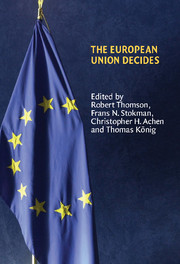Book contents
- Frontmatter
- Contents
- List of figures
- List of tables
- Notes on contributors
- Preface
- 1 Explaining legislative decision-making in the European Union
- 2 Research design: measuring actors' positions, saliences and capabilities
- 3 Testing procedural models of EU legislative decision-making
- 4 Institutional realism and bargaining models
- 5 Compromise, exchange and challenge in the European Union
- 6 Nash versus Schelling? The importance of constraints in legislative bargaining
- 7 A cooperative approach to decision-making in the European Union
- 8 A procedural exchange model of EU legislative politics
- 9 Beyond informal compromise: testing conditional formal procedures of EU decision-making
- 10 Evaluating political decision-making models
- 11 Evidence with insight: what models contribute to EU research
- Appendix I Selection of Commission proposals
- Appendix II Comparison of expert judgements with each other and with information from Council documentation
- References
- Index
- Title in this series
7 - A cooperative approach to decision-making in the European Union
Published online by Cambridge University Press: 22 September 2009
- Frontmatter
- Contents
- List of figures
- List of tables
- Notes on contributors
- Preface
- 1 Explaining legislative decision-making in the European Union
- 2 Research design: measuring actors' positions, saliences and capabilities
- 3 Testing procedural models of EU legislative decision-making
- 4 Institutional realism and bargaining models
- 5 Compromise, exchange and challenge in the European Union
- 6 Nash versus Schelling? The importance of constraints in legislative bargaining
- 7 A cooperative approach to decision-making in the European Union
- 8 A procedural exchange model of EU legislative politics
- 9 Beyond informal compromise: testing conditional formal procedures of EU decision-making
- 10 Evaluating political decision-making models
- 11 Evidence with insight: what models contribute to EU research
- Appendix I Selection of Commission proposals
- Appendix II Comparison of expert judgements with each other and with information from Council documentation
- References
- Index
- Title in this series
Summary
INTRODUCTION
An essential ingredient of politics is winning. What counts in politics is the passing of a bill, the amendment of a proposal, getting a policy accepted, or the enforcement of a decision. However, in general, it is impossible to win by staying alone. In politics, including European politics, it is necessary to form winning coalitions in order to enforce decisions.
Surely, in any political system, individual preferences with respect to a decision-making problem will diverge. Consequently, conflict will be at the heart of politics. However, this does not mean that coalitions are not important. In order to resolve conflict in political decision-making processes, cooperation and hence coalition-formation is essential. Conflict and cooperation are different sides of the same coin. Indeed, even if conflict is so strong that no resolution is possible, coalition-formation is still essential: in the extreme, it is necessary in order to revolutionise the system itself.
Since cooperation is an essential ingredient of politics, coalition-building cannot be neglected in the modelling of political decision-making. A framework that explicitly deals with cooperation and coalitions is cooperative game theory. In this chapter, we will use cooperative game theory to analyse decision-making in European politics.
However, cooperative game theory has a serious drawback: it is mainly geared towards solving games in terms of payoff structures, not in terms of coalitions. For quite some time, political scientists have been aware of this fact (e.g. see Riker 1962).
- Type
- Chapter
- Information
- The European Union Decides , pp. 178 - 210Publisher: Cambridge University PressPrint publication year: 2006
- 6
- Cited by



